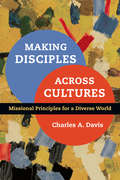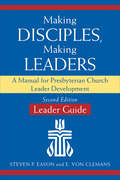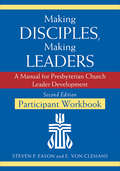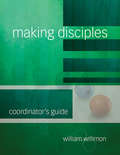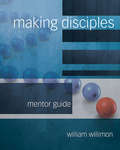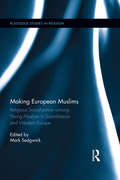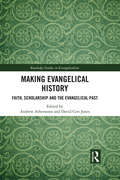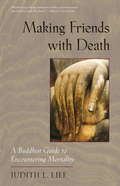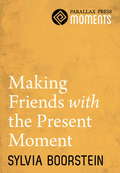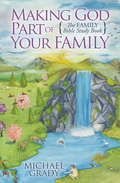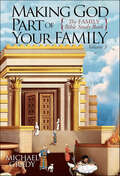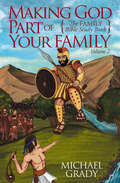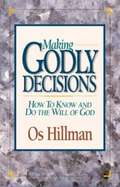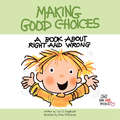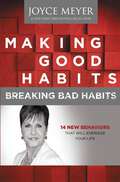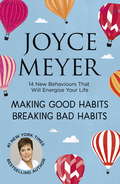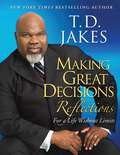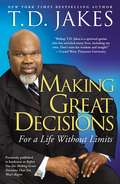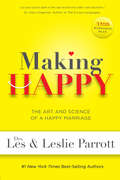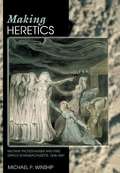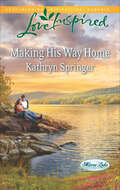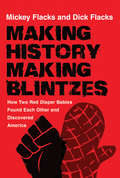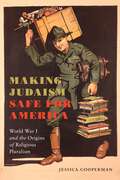- Table View
- List View
Making Disciples Across Cultures: Missional Principles for a Diverse World
by Charles A. DavisCulture affects how we make disciples. We often unconsciously bring our own cultural assumptions into ministry and mission, not realizing that how we think and operate is not necessarily the best or only way to do things. In today's global environment, disciplemaking requires the cultural humility and flexibility to adapt between different cultural approaches. Charles Davis, former director of TEAM, provides a framework for missional disciplemaking across diverse cultural contexts. He shows how we can recalibrate our ministry efforts, like adjusting sound levels on a mixer board, to accommodate different cultural assumptions. With on-the-ground stories from a lifetime of mission experience, Davis navigates such tensions as knowledge and behavior, individualism and collectivism, and truth and works to help Christian workers minister more effectively. Ministry teams, church planters, pastors and missionaries working interculturally at home or overseas can be part of God's movement of making disciples. Discover how the body of Christ grows in the unity and diversity of the global church.
Making Disciples, Making Leaders Leader Guide: A Manual For Presbyterian Church Leader Development
by Steven P. Eason E. Von ClemansThe second edition of the widely-used Making Disciples, Making Leaders is a comprehensive guide for creating effective spiritual leaders in the Presbyterian Church (U.S.A). With almost two decades of combined experience in training church leaders, Eason and Clemans have designed resources that can be customized to fit your church's unique needs. The book introduces biblical principles for leadership before describing the important task of the nominating committee. Pastors then receive a step-by-step curriculum for a four-session leadership training course. <P><P>With updates for the revised Form of Government, Making Disciples, Making Leaders--Leader Guide is the ultimate resource for PC(USA) leadership training. A participant workbook to the second edition, which includes worship aids, handouts, worksheets, quizzes, and study guides, is also available.
Making Disciples, Making Leaders Participant Workbook: A Manual For Presbyterian Church Leader Development
by Steven P. Eason E. Von ClemansThe second edition of the widely-used Making Disciples, Making Leaders is a comprehensive guide for creating effective spiritual leaders in the Presbyterian Church (U.S.A). With almost two decades of combined experience in training church leaders, Eason and Clemans have designed resources that can be customized to fit your church's unique needs. The book introduces biblical principles for leadership before describing the important task of the nominating committee. Pastors then receive a step-by-step curriculum for a four-session leadership training course. <P><P>With updates for the revised Form of Government, Making Disciples, Making Leaders--Participant Workbook includes worship aids, handouts, worksheets, quizzes, and study guides.
Making Disciples: Coordinator's Guide
by William H. WillimonMaking Disciples is a 13-session mentor-based confirmation program that pairs confirmands with adult mentors and guides them through a variety of learning experiences that will strengthen the student's understanding of the faith while connecting him or her with the community of believers in a personal way. It can be used as a stand-alone program, or in conjunction with your current curriculum as a special experiential unit. This is a confirmation program that is more like a process and less like a reading assignment, more engaging and congruent with the nature of the Christian faith than existing programs. Using an "apprenticeship" approach to confirmation Will Willimon produced a series of learning experiences where adult mentors and confirmands are both teachers and learners at the same time.This time-tested approach has been extensively revised and updated for usage in today’s churches that take seriously Christ’s command to be engaged in disciple making The Coordinator’s Guide can be used by the pastor, if that is how your congregation chooses to oversee and support the process of confirmation. However, it’s good to involve as many laypersons as possible in mentoring and guiding. This Coordinator’s Guide is designed to be easily used by a lay coordinator to support the mentors as they guide their confirmands through the journey toward confirmation.Topics explore the basics of Christian faith: •God •Jesus •the Holy Spirit •worship •the Bible •gifts •ministry •baptism •spiritual life •death and resurrection •the church
Making Disciples: Mentor Guide
by William H. WillimonMaking Disciples is a 13-session mentor-based confirmation program that pairs confirmands with adult mentors and guides them through a variety of learning experiences that will strengthen the student's understanding of the faith while connecting him or her with the community of believers in a personal way. It can be used as a stand-alone program, or in conjunction with your current curriculum as a special experiential unit. This is a confirmation program that is more like a process and less like a reading assignment, more engaging and congruent with the nature of the Christian faith than existing programs. Using an "apprenticeship" approach to confirmation Will Willimon produced a series of learning experiences where adult mentors and confirmands are both teachers and learners at the same time.This time-tested approach has been extensively revised and updated for usage in today’s churches that take seriously Christ’s command to be engaged in disciple making The bulk of the Mentor Guide is exactly the same as the Confirmand's Journal. You are encouraged to work through the activities right along with the confirmands and to complete the activities and writing assignments just as he or she does. By working along with your confirmand you will demonstrate the need to keep learning and growing.Topics explore the basics of Christian faith: •God •Jesus •the Holy Spirit •worship •the Bible •gifts •ministry •baptism •spiritual life •death and resurrection •the church
Making Early Medieval Societies
by Kate Cooper Conrad Leyser Cooper, Kate and Leyser, ConradMaking Early Medieval Societies explores a fundamental question: what held the small- and large-scale communities of the late Roman and early medieval West together, at a time when the world seemed to be falling apart? Historians and anthropologists have traditionally asked parallel questions about the rise and fall of empires and how societies create a sense of belonging and social order in the absence of strong governmental institutions. This book draws on classic and more recent anthropologists' work to consider dispute settlement and conflict management during and after the end of the Roman Empire. Contributions range across the internecine rivalries of late Roman bishops, the marital disputes of warrior kings, and the tension between religious leaders and the unruly crowds in western Europe after the first millennium - all considering the mechanisms through which conflict could be harnessed as a force for social stability or an engine for social change.
Making European Muslims: Religious Socialization Among Young Muslims in Scandinavia and Western Europe (Routledge Studies in Religion)
by Mark SedgwickMaking European Muslims provides an in-depth examination of what it means to be a young Muslim in Europe today, where the assumptions, values and behavior of the family and those of the majority society do not always coincide. Focusing on the religious socialization of Muslim children at home, in semi-private Islamic spaces such as mosques and Quran schools, and in public schools, the original contributions to this volume focus largely on countries in northern Europe, with a special emphasis on the Nordic region, primarily Denmark. Case studies demonstrate the ways that family life, public education, and government policy intersect in the lives of young Muslims and inform their developing religious beliefs and practices. Mark Sedgwick’s introduction provides a framework for theorizing Muslimness in the European context, arguing that Muslim children must navigate different and sometimes contradictory expectations and demands on their way to negotiating a European Muslim identity.
Making Evangelical History: Faith, Scholarship and the Evangelical Past (Routledge Studies in Evangelicalism)
by Andrew Atherstone David Ceri JonesThis volume makes a significant contribution to the ‘history of ecclesiastical histories’, with a fresh analysis of historians of evangelicalism from the eighteenth century to the present. It explores the ways in which their scholarly methods and theological agendas shaped their writings. Each chapter presents a case study in evangelical historiography. Some of the historians and biographers examined here were ministers and missionaries, while others were university scholars. They are drawn from Anglican, Baptist, Congregationalist, Methodist, Presbyterian, Fundamentalist and Pentecostal denominations. Their histories cover not only transatlantic evangelicalism, but also the spread of the movement across China, Africa, and indeed the whole globe. Some wrote for a popular Christian readership, emphasising edification and evangelical hagiography; others have produced weighty monographs for the academy. These case studies shed light on the way the discipline has developed, and also the heated controversies over whether one approach to evangelical history is more legitimate than the rest. As a result, this book will be of considerable interest to historians of religion.
Making Friends with Death: A Buddhist Guide to Encountering Mortality
by Judith L. LiefIn Making Friends with Death, Buddhist teacher Judith Lief, who's drawn her inspiration from the Tibetan Book of the Dead, shows us that through the powerful combination of contemplation of death and mindfulness practice, we can change how we relate to death, enhance our appreciation of everyday life, and use our developing acceptance of our own vulnerability as a basis for opening to others. She also offers a series of guidelines to help us reconnect with dying persons, whether they are friends or family, clients or patients.Lief highlights the value of relating to the immediacy of death as an ongoing aspect of everyday life by offering readers a variety of practical methods that they can apply to their lives and work. These methods include:Simple mindfulness exercises for deepening awareness of moment-by-moment changePractices for cultivating loving-kindnessHelpful slogans and guidelines for caregivers to useMaking Friends with Death will enlighten anyone interested in coming to terms with their own mortality. More specifically, the contemplative approach presented here offers health professionals, students of death and dying, and people who are helping a dying friend or relative useful guidance and inspiration. It will show them how to ground their actions in awareness and compassion, so that the steps they take in dealing with pain and suffering will be more effective.
Making Friends with the Present Moment
by Sylvia BoorsteinTaken from Sylvia Boorstein's influential contribution to Solid Ground , Boorstein invites readers to see things exactly the way they are, no matter how difficult.
Making God Part of Your Family: The Family Bible Study Book
by Michael GradyIf your family thinks the Bible is boring, it&’s probably because they don&’t know the full story! Veteran Bible teacher Michael Grady has compiled the Old Testament stories into concise, thought provoking doses intended to stimulate family discussions. The Old Testament is a history of God&’s family and you just might be surprised to learn who&’s in your family tree! These stories provide a unique combination: they are both simple enough for your children to understand and deep enough for parents to grow in the knowledge and wisdom of God&’s Word. This vibrant, carefully researched volume will bring your family closer together and help you clearly establish your family&’s identity as children of God and brothers and sisters of Jesus. Making God Part of Your Family is not just a book of Bible stories. It is a study book. Whether your goal is to spend 10–15 minutes on a dinner-time devotional or bedtime reading with your children, or spend more in-depth study time together once a week, this flexible resource will make it easier to carve out time amidst hectic schedules to study the Bible together, and help you to: Develop a better and deeper relationship with God our Father, and his son, JesusLearn how we are part of God&’s familyLearn how God expects us to live amidst the joys and sorrows of lifeApply practical lessons and eternal truths to the situations you face today
Making God Part of Your Family: The Family Bible Study Book Volume 3
by Michael GradyMaking God Part of Your Family Volume 3 strives to bring God’s plan to life for individuals and their families as He chose to reveal these truths through the stories in the Old Testament.Most would agree that the Old Testament stories can be difficult to relate to and understand. Veteran Bible teacher Michael Grady retells the Old Testament stories in concise, thought-provoking doses that are easy to understand and intended to stimulate family discussions. He demonstrates that the Old Testament stories are much more than just a history of the Israelites (God’s chosen family); they are parables detailing God’s guide to living and his eternal plan for redemption and salvation for all who choose to believe. The stories in Making God Part of Your Family Volume 3 provide a unique combination—they are both simple enough for children to understand and deep enough for parents to grow in the knowledge and wisdom of God’s Word. This vibrant, yet carefully researched volume brings families closer together and helps them clearly establish their identity as children of God and brothers and sisters of Jesus.
Making God Part of Your Family: The Family Bible Study Guide -volume 2 (The Family Bible Study Book #2)
by Michael GradyA veteran Bible teacher offers Old Testament stories and family discussion prompts in this accessible yet thoughtful Bible study book. In Making God Part of Your Family, Bible teacher Michael Grady presents the Old Testament stories in concise, thought provoking doses intended to stimulate family discussions. These stories are both simple enough for your children to understand and deep enough to offer new insights for parents who want to further their knowledge of God&’s Word. More than just a collection of Bible stories, this study book can help you more firmly establish your family&’s identity as children of God and brothers and sisters of Jesus. Whether your goal is to spend ten to fifteen minutes a day on a dinner-time devotional or bedtime reading with your children or spend more in-depth study time together once a week, this flexible resource will make it easier to establish a family routine amidst hectic schedules. Making God Part of Your Family can help you: Develop a deeper relationship with God our Father, and his son, JesusLearn how we are part of God&’s familyLearn how God expects us to live amidst the joys and sorrows of lifeApply practical lessons and eternal truths to the situations you face today
Making Godly Decisions: How to Know and Do the Will of God
by Os HillmanThe scripture says in Jeremiah 17:9 that "The heart is deceitful above all things and beyond cure. Who can understand it?" This passage begs, "What protects you and I from the deceit of our own heart?"Every day men and women are faced with life-changing decisions that impact their future. What method should they use for making those decisions? How can you know if you are making a decision that will be blessed by God? Are there some principles in God's Word that provide protection from making wrong decisions? Making Godly Decisions is a priceless book that will help you to understand the principles for making godly decisions, not just good decisions. Hillman provides answers to these troubling questions in a straightforward and practical way. He provides real-life case studies from his own spiritual journey that will show you how to apply these principles.
Making Good Choices
by Anne Fitzgerald Lisa O EngelhardtLearning to do the right thing is a lifelong task. Because children are newcomers on the path of social, moral, and spiritual development, they need caring guides to help them along the way. In Making Good Choices: A Book about Right and Wrong . . . Just for Me!, author Lisa O. Engelhardt helps children learn from their everyday choices and experiences to give them the skills and perspectives necessary to become compassionate, caring, and responsible adults.
Making Good Habits, Breaking Bad Habits: 14 New Behaviors That Will Energize Your Life
by Joyce MeyerFrom nail biting to cell phone addiction, procrastination to overspending, bad habits seem to outnumber the good ones. Unfortunately, we pay a price for bad habits that outweighs the immediate gratification that they bring.In this book, Joyce Meyer starts by examining the nature of habits. The first habit - and most important one to have - is the God Habit. By making it a habit to start your day by reading the Bible and communing with God, asking for His help in your efforts and His strength and sustenance, the stage is set for overcoming the habits you want to break and establishing new ones in their place.She then explores how to break bad habits by examining the destructive negative behavior patterns.The author moves on to discuss fourteen good habits and devotes a chapter to each. By the end of the chapter, the reader has a specific roadmap to follow until the behavior has become automatic (the definition of a habit). It's like following a GPS to get you to a new place. After traveling the same route several times, the GPS isn't needed for you to find your destination. The 'habit' of following the right route is ingrained.Among the habits discussed are:The God HabitThe Habit of Being DecisiveThe Health HabitThe Happy HabitThe Habit of FaithThe Habit of ExcellenceThe Habit of Being ResponsibleThe Generosity HabitThe Hurry HabitThe Discipline HabitThe Confidence Habit
Making Good Habits, Breaking Bad Habits: 14 New Behaviours That Will Energise Your Life
by Joyce MeyerFrom nail biting to cell phone addiction, procrastination to overspending, bad habits seem to outnumber the good ones. Unfortunately, we pay a price for bad habits that outweighs the immediate gratification that they bring.Experts say that at least forty per cent of what we do is solely the result of habit, which is why it is so important to make good habits and break bad ones. In this book, Joyce Meyer starts by examining the nature of habits. The first habit - and most important one to have - is the God Habit. By making it a habit to start your day by reading the Bible and communing with God, asking for His help in your efforts and His strength and sustenance, the stage is set for overcoming the habits you want to break and establishing new ones in their place.The author moves on to discuss fourteen good habits and devotes a chapter to each. The reader is given a specific roadmap to follow until the behaviour has become automatic (the definition of a habit). It's like following a SatNav to get you to a new place. After travelling the same route several times, the SatNav isn't needed for you to find your destination. The 'habit' of following the right route is ingrained.
Making Great Decisions Reflections: For a Life Without Limits
by T.D. JakesThe star of BETs Mind, Body & Soul, and featured guest speaker on Oprah’s Lifeclass, Potter’s House pastor, T.D. Jakes turns his attention to the topic of relationships, guiding you on the right track to making decisions you will benefit from for the rest of your life. In the vein of Joel Osteen’s Become a Better You and Dr. Phil’s Life Strategies, the New York Times bestselling Making Great Decisions (formerly tiled Before You Do) gives you the psychological and practical tools you need to reflect, discern, and decide the next step toward strong relationships in your life. “Remember,” writes T.D. Jakes, “your tomorrow is no better than the decisions you make today.” “My promise is that if you read this book, you will be equipped, you will know all you need to know about making foolproof relational decisions,” writes T.D. Jakes. Choosing the right partner, at home or at work, is one of the most consequential decisions we’ll ever make. How can we be sure that we’re choosing wisely? How do we know if we’re doing the right thing when we change careers? By breaking our decisions down into their five crucial components: Research: gathering information Roadwork: removing obstacles Rewards: listing choices and visualizing consequences Revelation: narrowing your options and making your selection Rearview: looking back and adjusting as necessary to stay on course Clear-sighted, realistic, and spiritually uplifting, Making Great Decisions is one of those rare books that can change lives.
Making Great Decisions: For a Life Without Limits
by T.D. JakesNew York Times bestselling author T.D. Jakes explains the tools that we need to know—whether we&’re single and looking to have a committed relationship or already married—before taking the next big step.The star of BET&’s Mind, Body & Soul, and featured guest speaker on Oprah&’s Lifeclass, Potter&’s House pastor, T.D. Jakes turns his attention to the topic of relationships, guiding you on the right track to making decisions you will benefit from for the rest of your life. In the vein of Joel Osteen&’s Become a Better You and Dr. Phil&’s Life Strategies, the New York Times bestselling Making Great Decisions gives you the psychological and practical tools you need to reflect, discern, and decide the next step toward strong relationships in your life. &“Remember,&” writes T.D. Jakes, &“your tomorrow is no better than the decisions you make today.&” &“My promise is that if you read this book, you will be equipped, you will know all you need to know about making foolproof relational decisions,&” writes T.D. Jakes. Choosing the right partner, at home or at work, is one of the most consequential decisions we&’ll ever make. How can we be sure that we&’re choosing wisely? How do we know if we&’re doing the right thing when we change careers? By breaking our decisions down into their five crucial components: -Research: gathering information -Roadwork: removing obstacles -Rewards: listing choices and visualizing consequences -Revelation: narrowing your options and making your selection -Rearview: looking back and adjusting as necessary to stay on course Clear-sighted, realistic, and spiritually uplifting, Making Great Decisions is one of those rare books that can change lives.
Making Happy: The Art and Science of a Happy Marriage
by Les Parrott Leslie ParrottDiscover the six counter-intuitive dials to turn right now in your relationship. these are proven happiness boosters. and let’s face it, knowing how to make happiness—the deep and abiding joy of feeling good together—isn’t always easy for time-starved and sleep-deprived couples. Making Happy will change all that by: Instantly making your relationship 25 percent happier. Countering the effects of taking each other for granted so you can notice even more things you appreciate about each other. Knowing the easy way to ensure your partner is happier today than yesterday. Relationship experts Drs. Les and Leslie Parrott bring all the relevant research together in Making Happy and show you how to elevate happiness in your relationship. It’s easier than you think. Includes an immensely practical three-week Happiness Plan.
Making Heretics: Militant Protestantism and Free Grace in Massachusetts, 1636-1641
by Michael P. WinshipMaking Heretics is a major new narrative of the famous Massachusetts disputes of the late 1630s misleadingly labeled the "antinomian controversy" by later historians. Drawing on an unprecedented range of sources, Michael Winship fundamentally recasts these interlocked religious and political struggles as a complex ongoing interaction of personalities and personal agendas and as a succession of short-term events with cumulative results. Previously neglected figures like Sir Henry Vane and John Wheelwright assume leading roles in the processes that nearly ended Massachusetts, while more familiar "hot Protestants" like John Cotton and Anne Hutchinson are relocated in larger frameworks. The book features a striking portrayal of the minister Thomas Shepard as an angry heresy-hunting militant, helping to set the volatile terms on which the disputes were conducted and keeping the flames of contention stoked even as he ostensibly attempted to quell them. The first book-length treatment in forty years, Making Heretics locates its story in rich contexts, ranging from ministerial quarrels and negotiations over fine but bitterly contested theological points to the shadowy worlds of orthodox and unorthodox lay piety, and from the transatlantic struggles over the Massachusetts Bay Company's charter to the fraught apocalyptic geopolitics of the Reformation itself. An object study in the ways that puritanism generated, managed, and failed to manage diversity, Making Heretics carries its account on into England in the 1640s and 1650s and helps explain the differing fortunes of puritanism in the Old and New Worlds.
Making His Way Home (Mirror Lake #6)
by Kathryn SpringerA Wisconsin pilot must face the life—and love—he left behind in his home town in this inspirational romance.You Can Go Home AgainThe only thing Cole Merrick wants to do with the Mirror Lake property he inherited is sell it. And the sooner the better. The handsome pilot has no attachment to the place where he and Grace Eversea fell in love years ago. He never meant to break his promises—or her heart—when he left town without a word. Now, just in time for Mirror Lake’s 125th birthday celebration, he comes face-to-face with all he left behind, including Grace. And he wonders if he ought to give this town a second chance. If only he can convince Grace to do the same for him. . . .
Making History / Making Blintzes: How Two Red Diaper Babies Found Each Other and Discovered America
by Mickey Flacks Dick FlacksMaking History/Making Blintzes is a chronicle of the political and personal lives of progressive activists Richard (Dick) and Miriam (Mickey) Flacks, two of the founders of Students for a Democratic Society (SDS). As active members of the Civil Rights movement and the anti-Vietnam War movement in the 1960s, and leaders in today’s social movements, their stories are a first-hand account of progressive American activism from the 1960s to the present. Throughout this memoir, the couple demonstrates that their lifelong commitment to making history through social activism cannot be understood without returning to the deeply personal context of their family history—of growing up “Red Diaper babies” in 1950s New York City, using folk music as self-expression as adolescents in the 1960s, and of making blintzes for their own family through the 1970s and 1980s. As the children of immigrants and first generation Jews, Dick and Mickey crafted their own religious identity as secular Jews, created a critical space for American progressive activism through SDS, and ultimately, found themselves raising an “American” family.
Making Judaism Safe for America: World War I and the Origins of Religious Pluralism (Religion and Social Transformation #4)
by Jessica CoopermanHonorable Mention, 2019 Saul Viener Book Prize, given by the American Jewish Historical SocietyA compelling story of how Judaism became integrated into mainstream American religion In 1956, the sociologist Will Herberg described the United States as a “triple-melting pot,” a country in which “three religious communities - Protestant, Catholic, Jewish – are America.” This description of an American society in which Judaism and Catholicism stood as equal partners to Protestantism begs explanation, as Protestantism had long been the dominant religious force in the U.S. How did Americans come to embrace Protestantism, Catholicism, and Judaism as “the three facets of American religion?”Historians have often turned to the experiences of World War II in order to explain this transformation. However, World War I’s impact on changing conceptions of American religion is too often overlooked. This book argues that World War I programs designed to protect the moral welfare of American servicemen brought new ideas about religious pluralism into structures of the military. Jessica Cooperman shines a light on how Jewish organizations were able to convince both military and civilian leaders that Jewish organizations, alongside Christian ones, played a necessary role in the moral and spiritual welfare of America’s fighting forces. This alone was significant, because acceptance within the military was useful in modeling acceptance in the larger society. The leaders of the newly formed Jewish Welfare Board, which became the military’s exclusive Jewish partner in the effort to maintain moral welfare among soldiers, used the opportunities created by war to negotiate a new place for Judaism in American society. Using the previously unexplored archival collections of the JWB, as well as soldiers’ letters, memoirs and War Department correspondence, Jessica Cooperman shows that the Board was able to exert strong control over expressions of Judaism within the military. By introducing young soldiers to what it saw as appropriately Americanized forms of Judaism and Jewish identity, the JWB hoped to prepare a generation of American Jewish men to assume positions of Jewish leadership while fitting comfortably into American society.This volume shows how, at this crucial turning point in world history, the JWB managed to use the policies and power of the U.S. government to advance its own agenda: to shape the future of American Judaism and to assert its place as a truly American religion.
